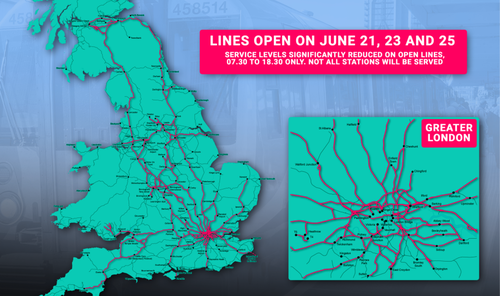"Make
no mistake, the level of service we will be able to offer will be
significantly compromised and passengers need to take that into account
and to plan ahead and only travel if it's really necessary to do so,"

By Tyler Durden: Tens of thousands of railway workers are preparing to strike across Britain and may cause transportation chaos next week as they demand higher wages amid the worst inflation in four decades.
Financial Times reports that 40,000 workers across Network Rail Limited, the owner and infrastructure manager of most of the railway networks in the UK, and 13 train operating companies, will strike next week for higher pay and against job cuts in one of the most significant strikes to hit UK railways in three decades.
Transportation turmoil begins next week as Network Rail warned only 4,500 of the regular 20,000 daily trains would be operational -- hours of operation will be reduced to 11 hours per day, between 0730 to 1830. Large parts of the railway network will be closed.
Network Rail lays out a map of the affected service areas that span the country.
"Make no mistake, the level of service we will be able to offer will be significantly compromised and passengers need to take that into account and to plan ahead and only travel if it's really necessary to do so," Network Rail boss Andrew Haines told BBC.
BBC describes the planned walkout as the "biggest rail strike in modern history" and comes one week after RMT and Network Rail couldn't agree on higher pay for workers.
Haines said Network Rail expects the strike to cost up to £150m in lost revenue.
"Once we have taken the pain of next week we will have around £150mn less money available to us as a system. The Treasury will either have to decide to fund that . . . or we will have to make more savings," he told FT.
Train strikes, record petrol prices at the pump, soaring energy and food bills, and overall inflation spiking to four-decade highs appear to be reminiscent of the stagflation years of the 1970s.
Earlier Thursday, the Bank of England hiked rates for the 5th straight time, raising interest rates by 25bps to 1.25% to curb inflation. We know that inflation is sticky, and rate hikes bring forward UK recession risks.
No comments:
Post a Comment